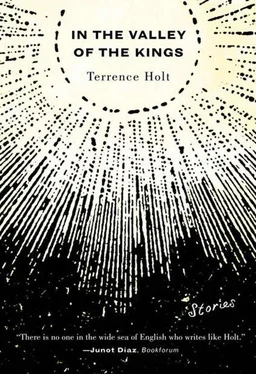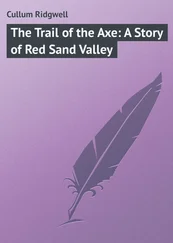I stepped out among the burial offerings to the King.
So I thought them: burial offerings. As I walked among them, a familiar voice revived within me, commenced cataloging, dating, guessing dynasties, proveniences, and there seemed at first no qualitative difference from the tombs of ordinary mortals I had rifled. But as I walked among mounds of treasure heaped in places to five times my height, strewn so thickly that at times I must abandon the floor to clamber on shifting cracking crumbling stacks of gilded chairs, panniers of bread, unguent-cups, burnished braziers, sphinxes, anubises, amulets, maces, trumpets, candlesticks, fans, every uncountable object of inscrutable intent, I began to doubt. These were no offerings: no nation, not even Egypt, could give up its wealth so wantonly, not to bury it forever with a dead King. The entire land had been stripped.
I knew now why no trace of him remained above the ground. There had been no silence. There had been no stilling of Egypt’s voice in the years of the King. It was all here. He had collected it all.
And then I knew also, with a certainty that made me gasp again in the still air of — not a tomb — I knew how wrong I had been, how utterly wrong from the start. The work of effacement, the revenge I thought his followers had wreaked on him: the silence that had swallowed him had been his own. He had set himself beneath his own horizon, then sealed shut the door, leaving no memory of himself behind. The word of power — if such there was — was a word to enforce oblivion.
So I told myself, but as I wandered through a wilderness of wealth, I knew it must have been far more than that. But what, and how, or why, still I did not know. What certainty I had once possessed was gone now, shattered by the force of my fall into — into something I could not even name: no single name seemed adequate any more. I could only walk, and, in the brief flashes I allowed myself of light, wonder.
I wandered at first through a warehouse of furniture, all made in the form of fabulous beasts.
When I turned on the light again I was neck-deep in pottery, blue glass jugs and bronzed ewers, faience flasks, bowls, vases, oviform urns.
I switched on the light again: towers of awls, adzes, augurs; saws, plumb lines, spatulas, trowels and glowing copper knives.
Out of darkness softness brushed my face, dropped down a clinging web about my head: linens, dyed in the geometries of Phoenicia, dim blue and rust.
I walked in a dry harbor of barges, feluccas lateen and square-rigged, galleys of fifty oars.
Baskets of grain, fields of wicker heaped high, receding to a dark horizon.
And in the distance, a dim reflection of my light: a wall.
I ran, scattering grain about me. I ran past endurance; stopped, small cries fluttering around me. I fed myself on fists full of grain gone soft as dust with age, and slaked my thirst from sealed jugs, smashing off their lids with unechoing blows, the liquid splashing across the floor, running under earthenware into darkness.
I ran, and drew no nearer to the light, no longer seeing what blocked my steps, familiar now with the unspeakable variety of the unfamiliar. I smashed it and ran over the remains.
I no longer ran. I stumbled, and as the time — minutes or months — passed, the wall grew higher, and lowered above me. And still it was beyond my outstretched hand.
I slept, atop pads of linen, a roll of bandage cloth beneath my head, the smell of age in my nostrils, and in my sleep a voice ran on, chanting names I did not know.
THE WALL OF the world I would have thought it, so high it climbed into what should have been the sky. To left and right my flashlight showed it vanish into darkness, as if it turned a corner into night. The wall was white, alabaster I thought from the warm, almost fleshly glow in my light. At the base of the wall, an empty cartouche, inlaid with gold, defined the outlines of a doorway. Beyond that door, the empty cartouche promised, I would find the King’s own name, and take it for my own.
A glyph, in gold, was centered above the door. It was a word of command: Uba . Open. Was I supposed to speak? I tried to say Uba , but my mouth was afraid. I approached closer, hoping I would see somewhere about it a polished hemisphere of stone. Behind me the darkness grew deeper. The old, familiar chill blew through me, and I was afraid.
There was no polished stone. I shone the beam upward in a spreading cone of light. There, five or fifty meters above my head, a dim suggestion of white on white, I thought I saw a protrusion, perhaps a dome of smooth stone. Perhaps the height was an illusion, I told myself, and reached. My hand stretched out, my arm pitifully short: it reached not even to the top of the door. I let it fall upon the door then, thinking that I would pound an answer from beyond, although I knew no one would answer.
My hand fell, but the door was not there: my arm swung an arc through empty air.
I was dizzy with the illusion, and almost fell into what I now saw plainly as an open archway. The space beyond was a tunnel, leading sharply down, its interior formed of the same blank white stone. The milky substance held no shadow, annihilating perspective: it was uba —open— what I had read as a command had been a description.
Steep stairs descended to a lower level, a low passageway through which I was forced to move on all fours. I hesitated, uneasy at the thought of all that darkness at my back.
I crouched low and crawled, the torch in my mouth.
A strange smell permeated the corridor: familiar, but alarmingly unplaceable. It raised gooseflesh on me before I had gone a dozen yards into the corridor.
The tunnel gave out high in the wall of the room that breathed the smell, and as my head emerged in open air I knew it, and was afraid again. The smell was damp: never in my life had I smelt water in an Egyptian tomb, where it could only mean something horribly amiss, indistinguishable from the fetor of death. But smelling it here, so strongly that my face seemed drenched in it, unnerved me for another reason as well, and more than anything I had seen in the great hall. The myriads of artifacts gathered there, the size of the construction — those had been mere logistics and engineering. But maintaining water in a tomb for over four thousand years: this was magic. This was something terrible, beyond my compass, a mystery of life-in-death.
From my perch high in the wall I shone the light around the cavern. At one time I might have thought it large: twenty meters, perhaps, in its longest dimension. Now it seemed uncomfortably cramped. Featureless, but for the water that filled it to a height perhaps a dozen feet below my downturned face. Only reluctantly did I shine the light down on the still surface (a mirror of obsidian, I might have thought it, were the smell of it not sending damp fingers over my flesh), and with an unreasoning horror of what I might see in its depths.
I saw only a bright disc of light. A disc of deeper darkness floated at its side. Between the reflection of the flashlight and the darkness in my eyes I saw only my own face, a dim-lit ovoid pale upon the water.
There was no ledge around the chamber; the floor was given over entirely to the pool, nor were there steps or rungs or cleats of any sort leading from my perch down to the surface. A dozen feet or so: not much to dive. And if the water is only inches deep? I will suffer a slight fall, nothing worse, I told myself. And if it is deep? I will swim. But neither falling nor drowning held me there, despite the terror I felt gathering in the constricted darkness at my back. The water itself: it frightened me. What might be in water that old? What slime? What smells? What — Before the panic could take me, I took one breath and swung out into the center of the pool.
Читать дальше










